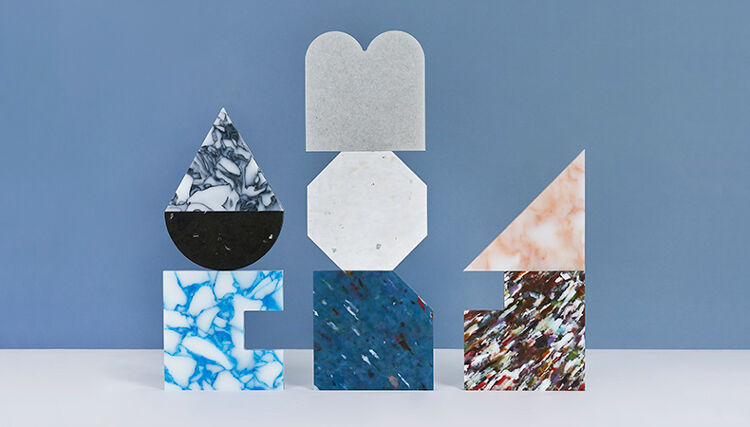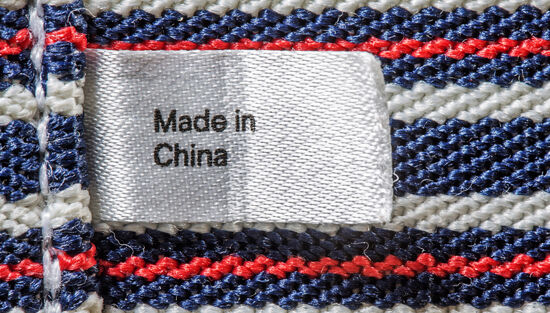How to not waste waste: creative ways to repurpose single-use plastic

Apphia Ferguson at Smile Plastics shows how to transform plastic and other waste into beautiful solid panels.
At Smile Plastics, our entire business was founded on the creative reimagining of ‘waste’ as a material of value. We take waste plastics and other materials traditionally classed as waste, and transform them through our unique processes into large-scale, solid surface panels.We tend to focus on single-use plastic packaging and other materials that would usually find their way to landfill. We chose these plastics to disrupt the unsustainable industrial ecosystems that have become the norm, whereby finite and useful materials have very short, single lives.

Technological advancements have allowed us to create our bespoke processing machinery, which is continually refined as we push the boundaries of output whilst maintaining quality and aesthetic beauty from a 100% recycled and recyclable products. Utilising and valuing plastic waste as a raw material is a relatively new business model at this qualitative level; therefore, our approach to the tool’s technology offers have to advance, not necessarily the technology itself. The sooner we recategorize ‘waste’ as high-value ‘legacy materials’, the sooner the transition of handling the material as precious and high-quality at every level of engagement.

Waste into new products
Our process is based on craftsmanship and high-quality engineering. Whether it’s the sourcing and sorting of raw materials or the manufacturing of panels and finished products, everything is handled with care and much of what we do is by hand.Predominantly, we recycle HIPS [high-impact polystyrene], PET [polyethylene terephthalate] and HDPE [high-density polyethylene] polymers. We use 100% of the raw material singularly in the panels to ensure they are 100% recyclable at end of life.
To keep our carbon footprint low, our equipment uses a fraction of the energy that traditional plastics processing machinery uses – and we’re constantly improving too. We also try to source our supplies as close as possible to our micro-factory in South Wales.
We keep the processing of the materials as low-intensity as possible. Not only do we have a lower carbon footprint, but the plastic compounds also don’t become denatured. This allows us to repurpose them repeatedly.
To achieve our unmistakable Smile patterns and textures, we ensure the narrative of the original material is continued through to its new life. This might be visually presented as metallic flecks in our popular Alba material, which reimagines discarded yoghurt pots to barcodes, branding and printed labels. Or, most recently, blizzard-like snowflake texture from repurposed fridges previously destined for landfill.

Repurposing end-of-life materials into new products
There is no waste, only more materials to utilise in different ways, from composting and recycling, to reuse from the original purpose. In the domestic setting, there are endless tips, tricks and hacks of how you can repurpose, from a tin can to deconstructing and reimaging old furniture. Since COVID-19 especially, social media is full of amazing ideas.In the commercial sector, we’ve worked with a range of companies looking at waste as raw material stock. Probably our favourite is Douglas McMaster of Silo restaurant in London, artfully creating delicious food solely from food waste. It is great to see so many other companies moving in this direction, utilising everything from glass bottles to bicycle tyres, and there appears to be a shift in our consumer habits. For us it starts as a consideration at the design stage: how do you ensure material capture at end-of-life is an easy process? Most materials need to be separated and pure to be of most value.

Can waste be beautiful?
Our ethos is on showcasing how beautiful recycled products can be. And we do this by focusing on narrative. As we’ve mentioned, including distinct traces of the plastics’ origins in their new life to tell the story of the material.This is underpinned by our process, based on craftsmanship and high-quality engineering. Much of what we do is by hand. And it’s this human touch at every step of production and finishing that gives the product a luxury quality.
This combination, we believe, elevates a humble material with perceived low value, to something of true, undeniable value. The proof of this is in our client roster of high-end brands and builds.

Commercial boundaries blur
Our core client base spans the retail, hospitality and residential sectors and, increasingly, the workplace too. As we settle into a post-pandemic landscape, we have seen a mass blurring of boundaries between almost all commercial spaces. In response, we have adapted our product offering to suit the flexible nature of these schemes, with new plank and panel sizes, for example.
Plans for the future
We’re continuing our mission to change people’s perception of waste plastics. And this is through our evolving product offering, plus exciting collaborations with likeminded brands and designers. This month, visitors to London’s Clerkenwell Design Week (24th to 26th May) will be the first to see a collection of furniture designed by Another Country, featuring Smile Plastics.The partnership signifies a key achievement for both businesses. At Smile, we're renowned for reimagining ‘waste’ and predominantly working with plastic to make exceptionally designed surfaces. Another Country creates stunning heritage furniture pieces celebrating natural materials. The concept behind the collection is to enable Another Country to fully embody its sustainability mission, and for us to branch out into new material avenues.

Advice for printers about sustainability
Change your mindset. Open yourself and your business up to circularity. The only way the world can become truly sustainable and resilient is for everyone to buy into, and participate in, the circular economy. Waste material should no longer be considered low value. With the right processes the same material can be used and re-used infinitely, without loss of quality. It’s something we feel extremely passionate about here at Smile Plastics, and we’re keen to share our experience with other industries to secure a brighter future for all.
Become a FESPA member to continue reading
To read more and access exclusive content on the Club FESPA portal, please contact your Local Association. If you are not a current member, please enquire here. If there is no FESPA Association in your country, you can join FESPA Direct. Once you become a FESPA member, you can gain access to the Club FESPA Portal.
Topics
Recent news

Regulation guidance: Corporate Sustainability Reporting Directive
The Corporate Sustainability Reporting Directive (CSRD) is now in effect, but with further changes on the horizon, what does it mean for printers? Sustainability consultant Rachel England outlines everything you need to know and talks to Apigraf about how your business may be affected.

Web-to-print design: Canva versus Kittl
We look at popular design packages Canva and Kittl to determine how they compare regarding graphic design and print on demand.

FESPA in South Africa: the print skills to thrive
Printing SA’s Career Day inspired young Cape Town learners to explore printing and packaging careers.

The rise of Chinese printers
Chinese printing companies are on the rise, and have their eyes set on the UK and EU marketplace. Some have made an instant impact; others are running into issues with maintenance and language barriers. What does the future hold for Chinese printing firms, and how can you navigate working with them?